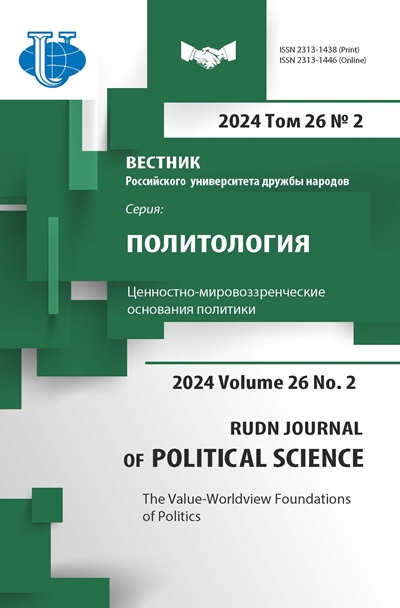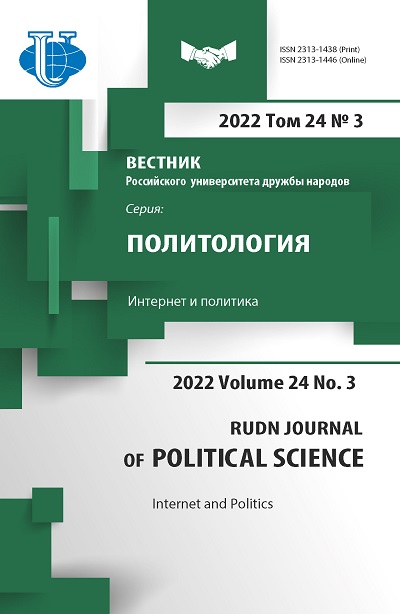Digital Political Communication in Russia: Values of Humanism vs. Technocratic Approach
- Authors: Bykov I.A.1, Kurushkin S.V.1
-
Affiliations:
- Saint Petersburg State University
- Issue: Vol 24, No 3 (2022): Internet and Politics
- Pages: 419-432
- Section: DIGITAL POLITICS
- URL: https://journals.rudn.ru/political-science/article/view/31848
- DOI: https://doi.org/10.22363/2313-1438-2022-24-3-419-432
Cite item
Full Text
Abstract
The massive spread of digital technologies has led to the transformation of practices related to communication and, in particular, political communication. The development of digital technologies in political communication results in the emergence of new participants, who can be called network actors, the perception of which by various social groups is transformed under the influence of the values shared by the communication parties. The research discusses the current state of the communications theory in the light of the digitalizing media space and the transforming humanistic values. The authors suggest applying the ideas of post-humanistic philosophy to the analysis of the problems and prospects of political communication in the context of digitalization. The purpose of the research is to study the specific features of political communication in a digital society based on an anthropocentric approach and in the context of opposing modern humanistic values to the ideas of technocratic control and management. The empirical basis of the study includes the results of two focus groups (students and senior citizens) held in St. Petersburg in the spring of 2022, where participants discussed the problems of communication between people and chatbots. It was found that although young people in general interacted more actively with chatbots, both age groups showed a favorable attitude towards chatbots and technological progress. However, in the senior age group, humanistic values manifested themselves more explicitly (the problem of a “live voice”, issues related to the emotional component of communication, and even concern for jobs that people might lose). The authors conclude about the insufficiency of the technocratic approach and the need to take into account the values of modern humanism in implementing new forms of communication with network actors.
About the authors
Ilya A. Bykov
Saint Petersburg State University
Email: i.bykov@sbpu.ru
ORCID iD: 0000-0001-8462-5320
Doctor in Political Science, Professor of the Department of Public Relations in Politics and Public Administration
Saint Petersburg, Russian FederationSergey V. Kurushkin
Saint Petersburg State University
Author for correspondence.
Email: s.kurushkin@spbu.ru
ORCID iD: 0000-0001-6154-6988
PhD in Political Science, Lecturer of the Department of Theory of Journalism and Mass Communications
Saint Petersburg, Russian FederationReferences
- Adamopoulou, E., & Moussiades, L. (2020). Chatbots: History, technology, and applications. Machine Learning with Applications, 2, 100-106. https://doi.org/10.1016/j.mlwa.2020.100006
- Androutsopoulou, A., Karacapilidis, N., Loukis, E., & Charalabidis, Y. (2019). Transforming the communication between citizens and government through AI-guided chatbots. Government Information Quarterly, 36, 358–367. https://doi.org/10.1016/j.giq.2018.10.001
- Baeva, L.V. (2018). Escapism in digital society: from hikikomori to “groups of death”. Values and meanings, 2(54), 53–68. (In Russian)
- Bresler, M.G. (2020). Ontology of network being. Ufa: UGNTU. (In Russian).
- Bykov, I.A. (2020). Artificial intelligence as a source of political judgments. Journal of political studies, 4(2), 23–33. (In Russian).
- Chalmers, D.J. (2022). Reality+: Virtual Worlds and the Problems of Philosophy. N. Y.: W.W. Norton & Company.
- DeCicco, R., Silva, S.C., & Alparone, F.R. (2020). Millennials’ attitude toward chatbots: an experimental study in a social relationship perspective. International Journal of Retail & Distribution Management, 48(11), 1213–1233. https://doi.org/10.1108/ IJRDM-12-2019-0406
- Efremenko, D.V. (2012). Technology in politics: from megapower to nanobots et vice versa. Politex: Political Expertise, 4, 46–63. (In Russian).
- Erofeeva, M.A. (2015). Actors-network theory and problem of social action. Sociology of power, 27(1), 17–33. (In Russian).
- Fedorchenko, S.N. (2020). The importance of AI for political regime in Russia: problems of legitimacy, information security and soft power. Bulletin of the Moscow Regional State University. Series: History and Political Sciences, 1, 41–53. (In Russian).
- Folstad, A., & Brandtzaeg, P.B. (2020). Users’ experiences with chatbots: findings from a questionnaire study. Quality and User Experience, 5(3), https://doi.org/10.1007/ s41233-020-00033-2
- Gavra, D.P. (2011). Basics of communication theory. St.Petersburg: Piter. (In Russian).
- Grishin, N.V. (2021). Reinforcement theory and study of the impact of internet technologies on political participation of modern youth. RUDN Journal of Political Science, 23(1), 47–59. (In Russian).
- Gumus, N., Cark, O. (2021). The effect of customers’ attitudes towards chatbots on their experience and behavioral intention in Turkey. Interdisciplinary Description of Complex Systems, 19(3), 420–436.
- Hughes, J. (2004). Citizen Cyborg: Why Democratic Societies Must Respond to the Redesigned Human of the Future. N. Y.: Basic Books.
- Isaev, I.A. (2018). Technology power: sources of technocracy. History and Law Problems: New Recurs, 4, 143-153. (In Russian).
- Ivanov, A.D. (2015). The robotic journalism and the first algorithms on service of editions of the international mass media. Znak: problemnoe pole mediaobrazovanija, 2, 32–40. (In Russian). Kokoshin, A.A. (2009). Technocracy, technocrats and neotechnocrats. M.: URSS. (In Russian).
- Kulikova, O.M., Suvorova, S.D. (2021). Role of chatbots in effective communication. International journal of humanitarian and hard sciences, (4–3), 33–37. (In Russian).
- Latour, B. (2007). On interobjectivity. Sociological review, 6(2), 79–96. (In Russian). [Latour, B. (1996). On interobjectivity. Mind, Culture, and Activity, 3(4), 228–245.]
- Linde, A.N. (2017). The problem of relation between humanistic and technological schools in the theory of social-political communication. Communication. Media. Design, (2), 82–98. (In Russian).
- Martyanov, D.S. (Ed.). (2019). Manageability and discourse of virtual communities in conditions of post-truth politics. St Petersburg: ElecSys. (In Russian).
- Powell, J. (2019). Trust me, I’m a chatbot: How artificial intelligence in health care fails the turing test. Journal of Medical Internet Research, 21(10), e16222. https://www.jmir.org/2019/10/e16222/
- Sidorov, V.A. (Еd.). (2019). Communicative aggression in XXI. St. Petersburg: Aleteya. (In Russian).
- Smorgunov, L.V. (Еd.). (2021). Outsourcing of political judgments: problems of communication in digital platforms. Moscow: Rosspen. (In Russian).
- Srnichek, N. (2016). Platform Capitalism. N. Y.: Polity.
- Volodenkov, S.N., & Fedorchenko, S.N. (2021). Subjectness of digital communication in the context of technological evolution of the Internet: features and transformation scenarios. Political science (RU), 3, 37–53. (In Russian). http://www.doi.org/10.31249/poln/2021.03.02
- Woolley, S., & Howard, P. (Eds.). (2019). Сomputational Propaganda: Political Parties, Politicians, and Political Manipulation on Social Media. Oxford: Oxford University Press.
















